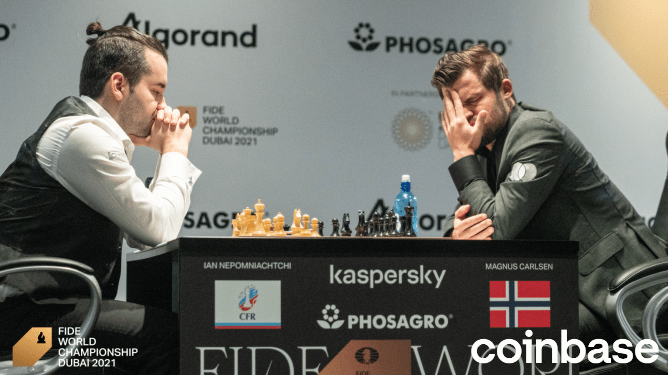
FIDE World Chess Championship Game 1: Nepo Impresses Under Pressure
World Champion Magnus Carlsen and challenger GM Ian Nepomniachtchi started their FIDE World Championship match on Friday in Dubai with a draw. Nepomniachtchi had a slight opening advantage but got under some pressure soon after, and then impressed with accurate endgame play. The second game is scheduled for Saturday at 16:30 Dubai (13:30 CET, 4:30 a.m. Pacific).
You can watch the 2021 FIDE World Chess Championship live on Chess.com/TV and on our Twitch and YouTube channels. You can also keep up with all the details here on our live events platform.
Delayed by a full year due to the coronavirus pandemic, the world championship of chess finally got underway on Friday in the Dubai Exhibition Center. Carlsen and Nepomniachtchi, the world number one vs. the world number five, met at the board for the first time as little boys at the 2002 European under-12 championship in Peniscola, Spain. They (Nepo at 31, Carlsen will turn 31 on Nov. 30) are now facing each other with a world title at stake—as well as a €2 million prize fund.
Norway's Carlsen, who obtained the title in 2013 and defended it successfully three times, is playing his fifth title match. Nepomniachtchi, who plays his first championship, is from Russia but doesn't play under the Russian flag.
The World Anti-Doping Agency ban on Russia is still active and is applied to athletes competing in world-championship-level events, where Russia's flag, name, and anthem are not allowed. Nepomniachtchi's flag on the table initially showed the logo of the Russian Chess Federation with the name of the federation spelled out, but at the last minute it had to be replaced with one saying just "CFR."
"Obviously that's not a good thing, to play without your usual flag and your usual anthem but, you know, during a chess game you think about moves," Nepomniachtchi said after the game.
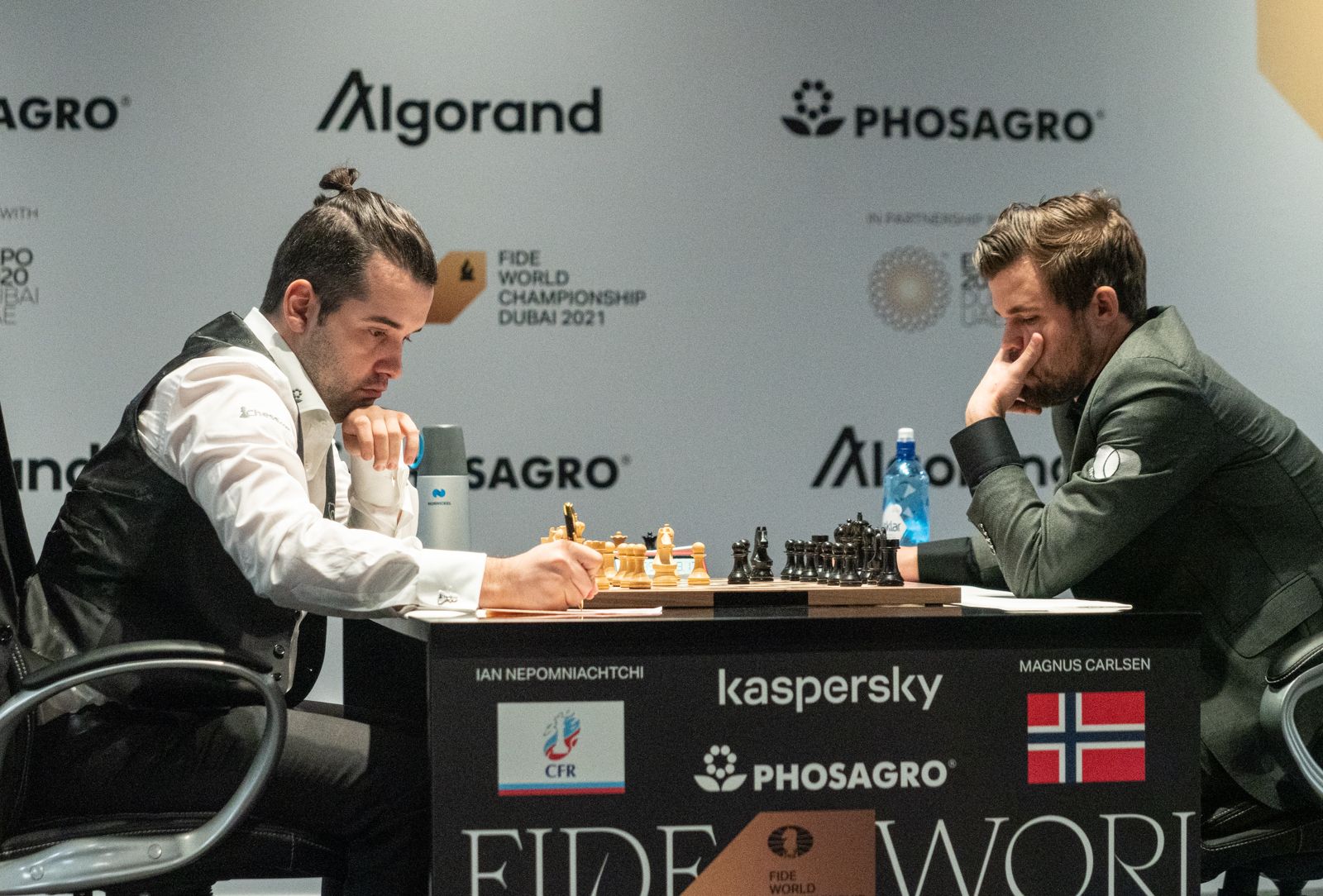
The two contestants had played 14 classical games before the match (famously in favor of the challenger by 4 to 1) and are scheduled to play 14 in the coming three weeks, two more than we're used to. In the last eight title matches, between 2006 and 2018, the match was over 12 games before a rapid/blitz tiebreak would kick in.
Another change is the schedule, and it's a good one. FIDE has made sure that there will be no rest days during the weekends (which ensures more viewers!) so we'll have game days on Fridays, Saturdays, Sundays, Tuesdays, and Wednesdays.
As the biggest chess event in Dubai since the 27th Chess Olympiad in 1986, the match is held alongside the Expo 2020, which showcases 200 pavilions, out of which 191 are representative of participating countries. The Spanish pavilion is strongly chess-themed.
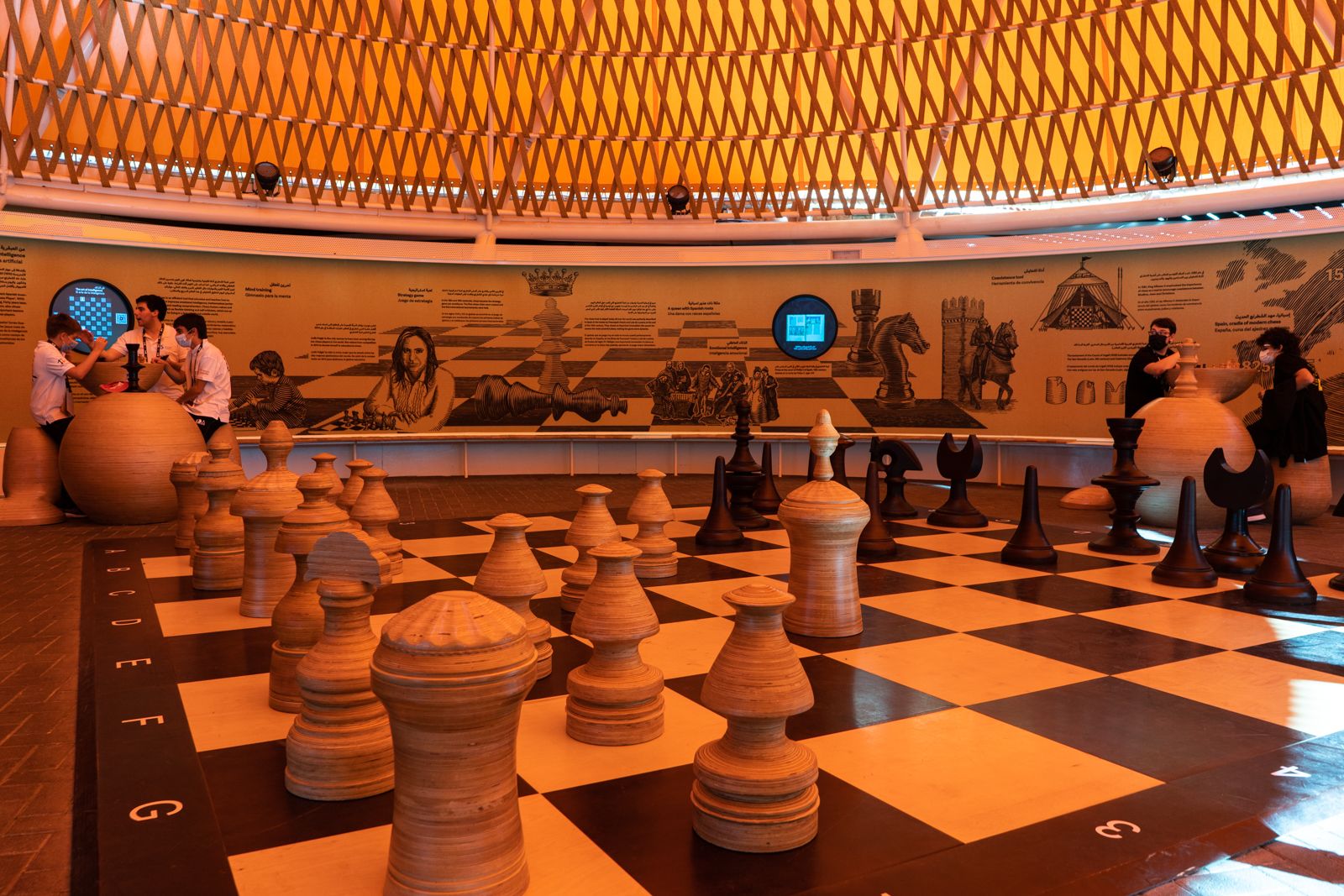
A key figure in the local chess scene sadly couldn't experience this match in his home country. Ali Abu Khalil, considered a founding father of chess in the UAE, passed away the morning before the first game.
Carlsen has good memories of Dubai. It was where he scored his third GM norm in 2004, and it was also in Dubai, 10 years later, where he won the world rapid and world blitz championships, becoming the first player to hold the title in all three formats. Second in the blitz that year was... Nepomniachtchi.
Like in recent title matches, a glass wall separates the spectators and the players. The glass is not natively one-way glass but functions as such when the lights go out in the spectator area.
A bit over 300 spectators paid for a ticket on this first day, with prices ranging from 95 AED (U.S. $26) to 1900 AED (U.S. $517) for VIPs. A nice touch from the organizers, which has been the standard at the Dortmund super-tournament for many years but something that other top events are often lacking, is that the spectators can listen to the local commentary (by GMs Vishy Anand and Anna Muzychuk) using transmitters and headphones.
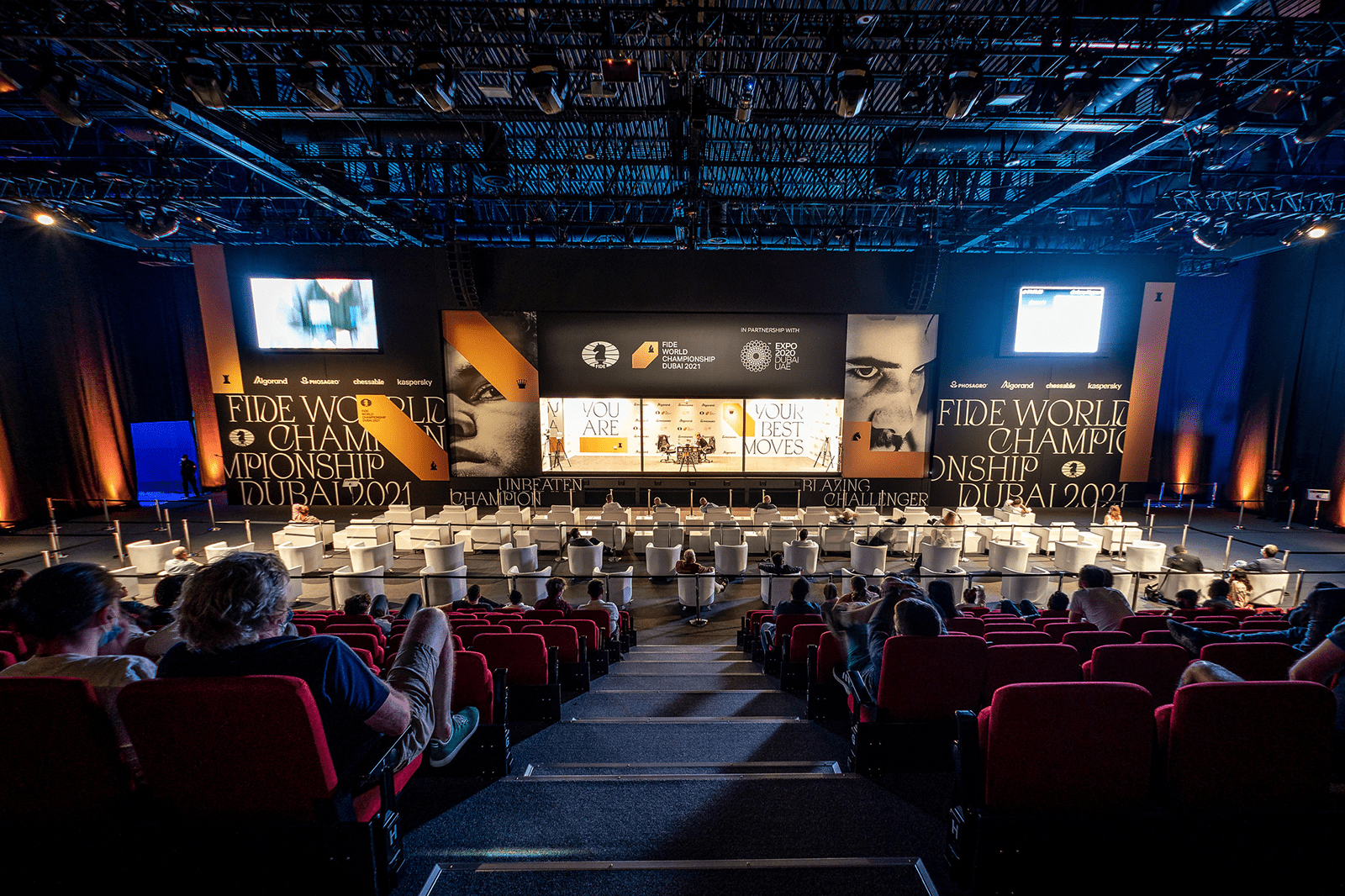
The draw in game one was not a big surprise; also in the previous five title matches, the opening game had ended undecided (in the last match, in 2018, all regular games ended in draws). In the 45 matches in chess history, starting from Steinitz-Zukertort in 1886, decisive opening games have been more common: 26 times, compared to 19 draws, before today.
The opening phase of this first game in Dubai instantly revealed the deep preparation from the players and their use of the latest technology including neural-network-based engines such as Stockfish and Leela Zero.
Nepomniachtchi, who arrived at the board more than 15 minutes before the start, opened with 1.e4 and played the Ruy Lopez (3.Bb5). He has experience with the Scotch Opening (3.d4) as well, and if any modern-day match could see that opening—after GM Garry Kasparov revived it in his match with GM Anatoly Karpov in 1990—it's this one.
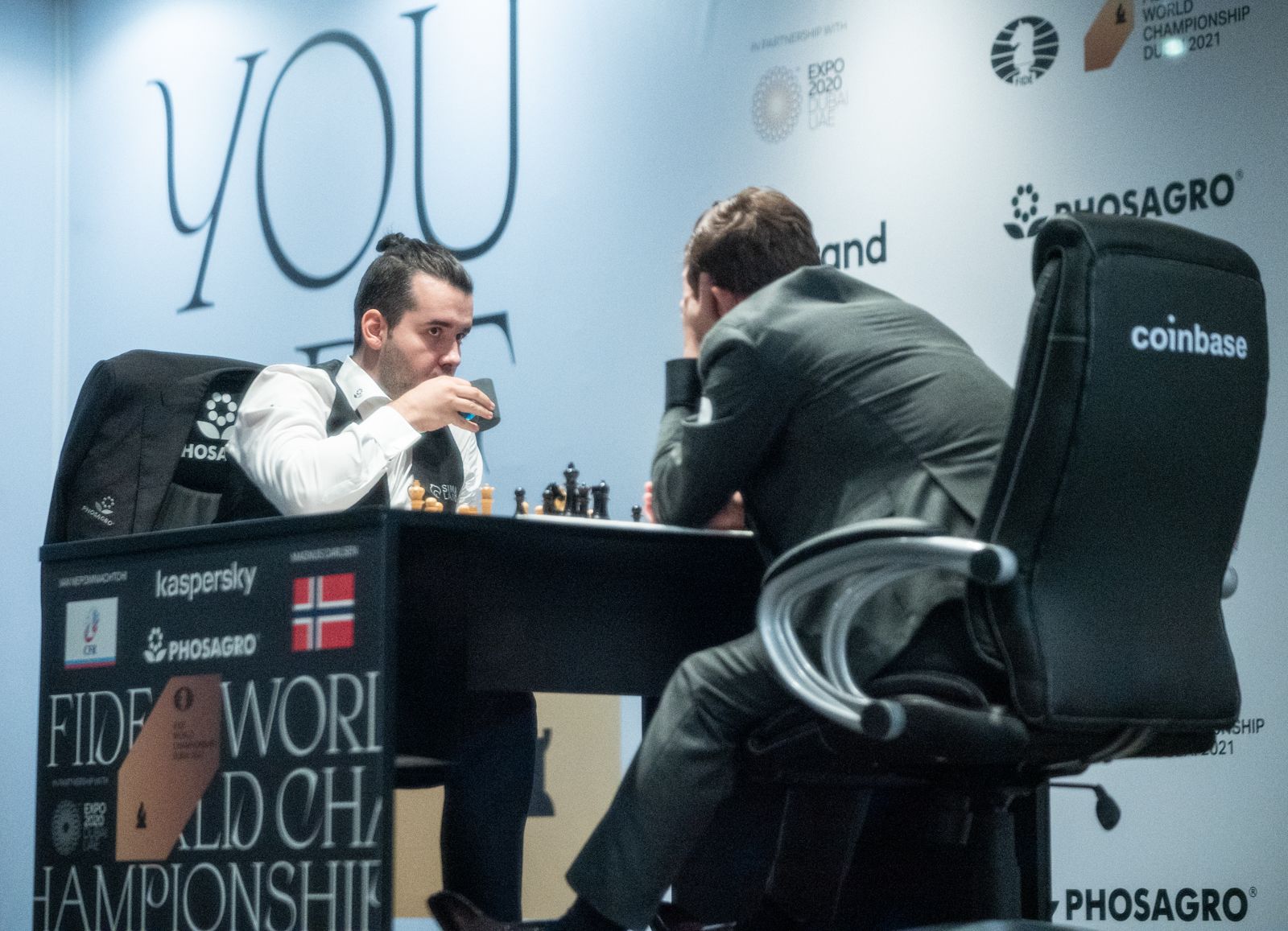
Carlsen did not go for the dreaded Berlin variation just yet and went for 3...a6 instead. Like he had done twice in his 2016 match with GM Sergey Karjakin, the world champion played the setup of the Marshall Gambit and, like Karjakin, Nepomniachtchi declined the gambit with 8.h3.
The last time the gambit was accepted in a world championship was in Kramnik-Leko in 2004. 11 years earlier, GM Garry Kasparov had also declined it.
In 1993, @Kasparov63 set the renowned Soviet theoretician, Efim Geller, to work on the Marshall Attack. He reported back that White had no advantage in any line. 30 years later, that view apparently still prevails. #FIDEmatch2021
— Nigel Short (@nigelshortchess) November 26, 2021
The first big surprise came from Carlsen on move eight. The interesting 8…Na5 is the sixth most popular move in the position among humans but happens to be the first choice of Leela.
Position after 8...Na5.
It resembles the Gajewski Gambit (1.e4 e5 2.Nf3 Nc6 3.Bb5 a6 4.Ba4 Nf6 5.0-0 Be7 6.Re1 b5 7.Bb3 d6 8.c3 0-0 9.h3 Na5 10.Bc2 d5), invented by the Polish GM and long-time second of Anand GM Grzegorz Gajewski, who himself tweeted:
How many Gajewski Gambits are there??!! #CarlsenNepo
— Grzegorz Gajewski (@GajuChess) November 26, 2021
Nepomniachtchi almost instantly replied with 9.Nxe5, showing that his team had also looked at this line. His seconds are GM Sergey Yanovsky (one of his earliest trainers), GM Vladimir Potkin but also Karjakin, who was seen at the opening ceremony alongside his good friend GM Teimour Radjabov. Whether the Azerbaijani top GM is part of Nepomniachtchi's team as well hasn't been confirmed yet.
Officially, nothing has been revealed yet about Carlsen's team, although it's highly likely that GMs Peter Heine Nielsen and Laurent Fressinet are once again working for him. When a reporter asked Carlsen at the press conference whether his opening choice suggested he also has a German in the team (referring to GM Jan Gustafsson, a connaisseur of the Marshall), Carlsen provided the best quote of the day: "You may speculate as much as you want; that's half the fun of being a journalist at a world championship match!"
You may speculate as much as you want, that's half the fun of being a journalist at a world championship match!
—Magnus Carlsen
According to a German reporter, Nepomniachtchi's team also includes Marcus Lindner, the athletic coach of basketball club Bayern Munich. Another "team member" was revealed by Nepomniachtchi shortly before the match in an interview with The Guardian. Like at the Candidates, he has had access to the Zhores supercomputer, based in the Skolkovo Institute of Science and Technology in Moscow.
"It can’t harm my chances, Nepomniachtchi said about that. "And this particular supercomputer, because it is a huge data center which can be used for scientific research, is hopefully more effective than others."
An interesting twist is that the chairman of the Skolkovo Foundation is FIDE President Arkady Dvorkovich. Together with PhosAgro being the main sponsor of the match, it is clear that Russia has had plenty of opportunities to help their participant.
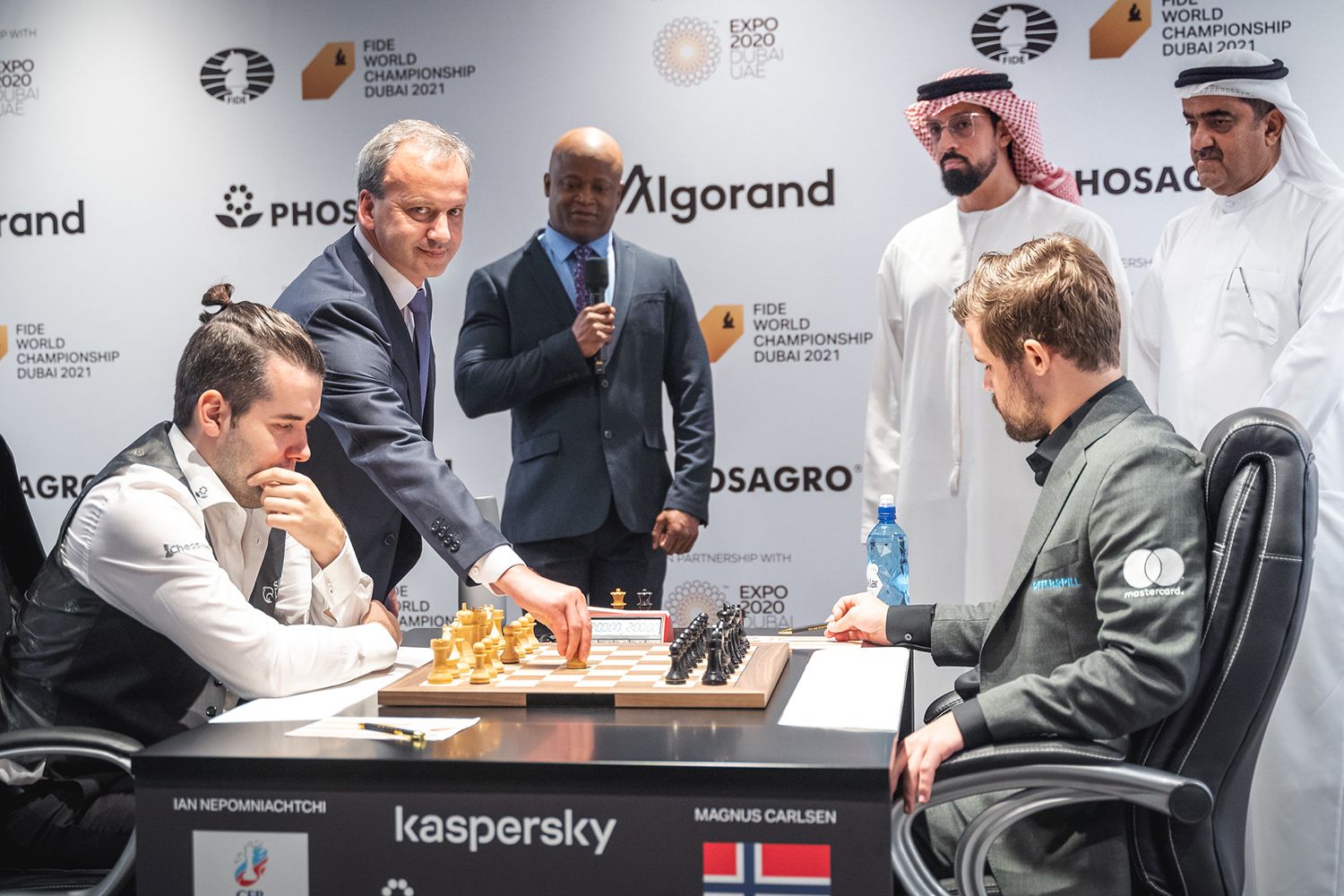
Back to the game, where the players continued playing relatively fast until move 16, which included the odd-looking sequence 14.Kf1 Rfb8.
Key Move of the Day: 14.Kf1!!
This mysterious move is given as brilliant by the engine and attests to Nepomniachtchi's high-level opening preparation. This move has never been played in grandmaster games (although it has in correspondence), so it's an opening novelty! According to Caruana's explanation in the live broadcast, there are two ideas: (1) to bring the king closer to the center in anticipation of the endgame and (2) to meet 14. ...Qxe5 with 15.Qxb7 and the rook on e1 is defended.
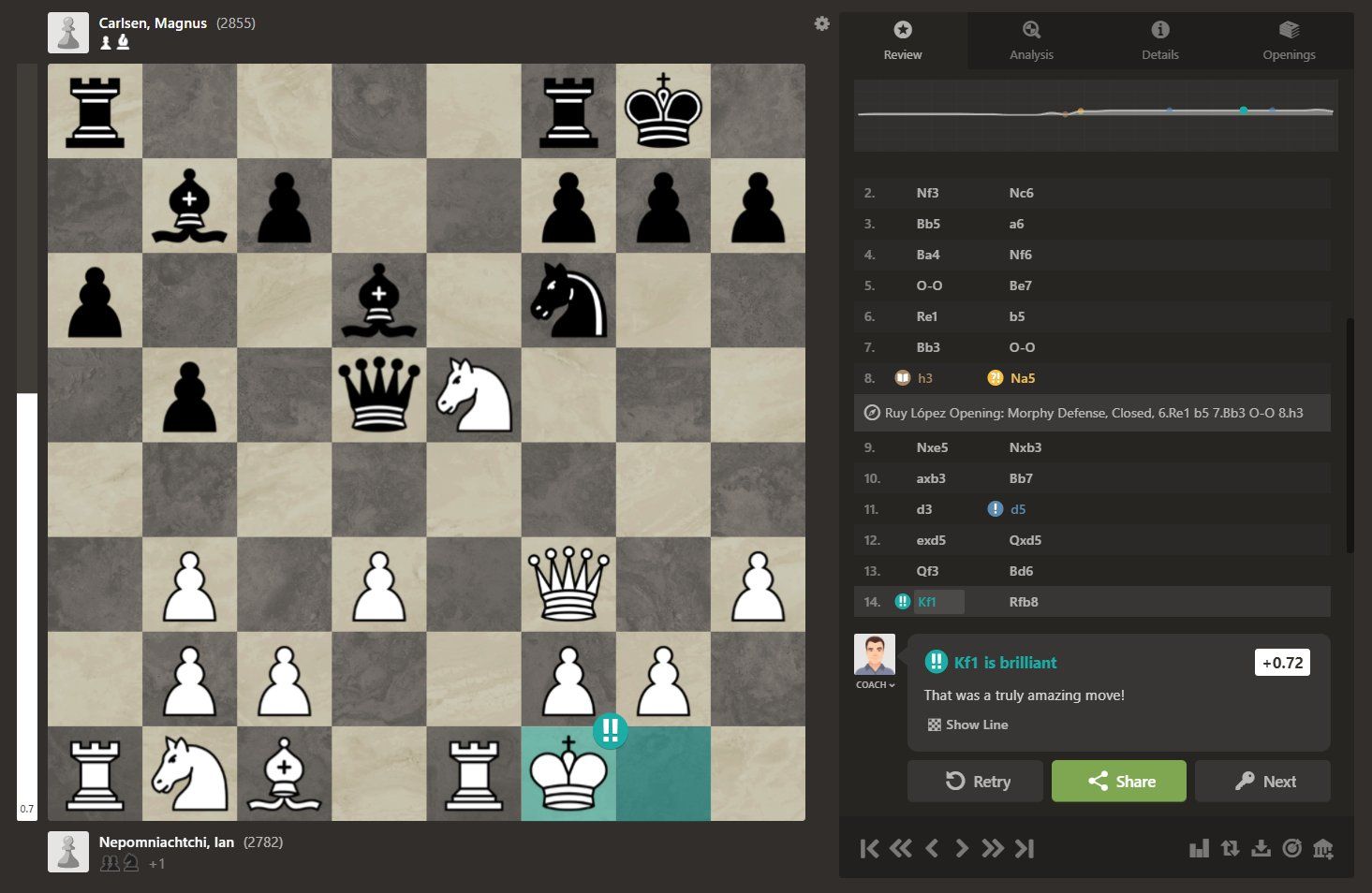
After 14 moves, the game had left over-the-board practice among humans. However, GM Erwin l'Ami pointed out on Twitter, the queenless middlegame position had been tested extensively by engines.
A ton of engines games have reached the current position. Most of them continued 17.Nc3 Nb4 18.Rac1 when White can try to make use of the extra pawn. #CarlsenNepo pic.twitter.com/X0ScYoiqR4
— Erwin l'Ami (@erwinlami) November 26, 2021
Even though it wasn't a real Marshall gambit, the situation was similar to it: an extra pawn for White with compensation for Black in the form of the bishop pair and activity. Apart from that, it was also: "Nepomniachtchi is objectively better but Magnus knows the position," as GM our star commentator GM Fabiano Caruana remarked in the Chess.com broadcast.
"I was very slightly optimistic during the whole game," Nepomniachtchi would say afterward. "This is quite a curious line for Black with very thin compensation."
"I didn't particularly mind the position that I got," countered Carlsen. "The opening that I played is not one you can afford to play if you're not fine being down a pawn with the bishop pair. But after that, it does, in general, feel like White has a little bit more potential to maneuver and Black usually has to react a bit more."

Soon, two pairs of minor pieces were traded, which also involved the damaging of White's kingside pawn structure. Nepomniachtchi called his 22.Bf4 "logical" as it trades a pair of bishops. "But it doesn't work due to some positional and tactical reasons," he noted. "So, basically, after I let these exchanges happen, it was never something [where] I could [have more] than a draw."
Carlsen, on that phase: "I was pretty happy with the plan that I found eventually: giving up the bishop pair to some extent looks very counter-intuitive, but I thought that I would still have reasonable compensation with his weakened pawn structure and relatively passive pieces. At least in the game, I was at least half vindicated."
Caruana wasn't a big fan of Nepomniachtchi's somewhat passive-looking 33.Ng2 and after 33...b4 it started to become clear that Carlsen was in his element.
Position after 33...b4.
Afterward, Carlsen admitted he had been "slightly worried" earlier in the game but felt better here: "I was happy to find this idea with 33…b4, but I knew that if he remained prudent there and brought his king over I thought chances of winning the game were not realistic."
Having played the opening phase so quickly, the players did not get anywhere near time trouble. In that final phase of the game, Nepomniachtchi played impressively accurate chess to avoid any bigger troubles than the slight pressure he was under.
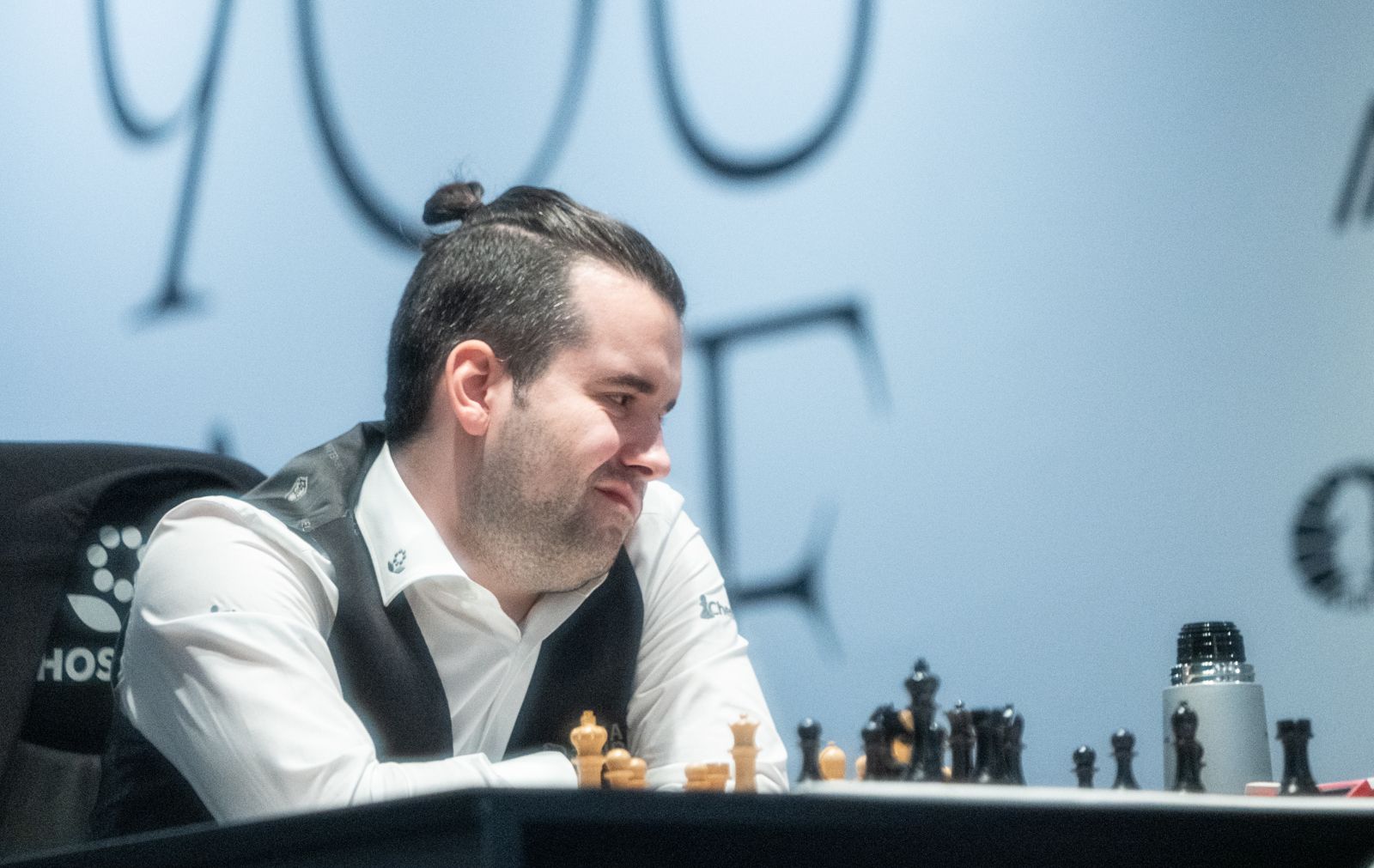
Five moves after the time control, the game ended in a draw—shortly after Caruana had said about Nepomniachtchi: "He is not the type of player to force a draw in this position," although the former challenger quickly added that things work differently in world championship matches.
Caruana gave a live summary of his analysis immediately after the game, shortly before the press conference.
Nepomniachtchi had mixed feelings about starting his first-ever title with a draw as White. "Normally as White, you want to try to win but a draw is also somewhat a result. It was, I guess, a fine game for Magnus so I don't feel something specific."
When a journalist pushed him to share a bit more about how he feels, the Russian GM replied: "I feel like you feel after a draw with the white pieces. I mean, that's quite a usual result nowadays, but still, obviously, you want more."
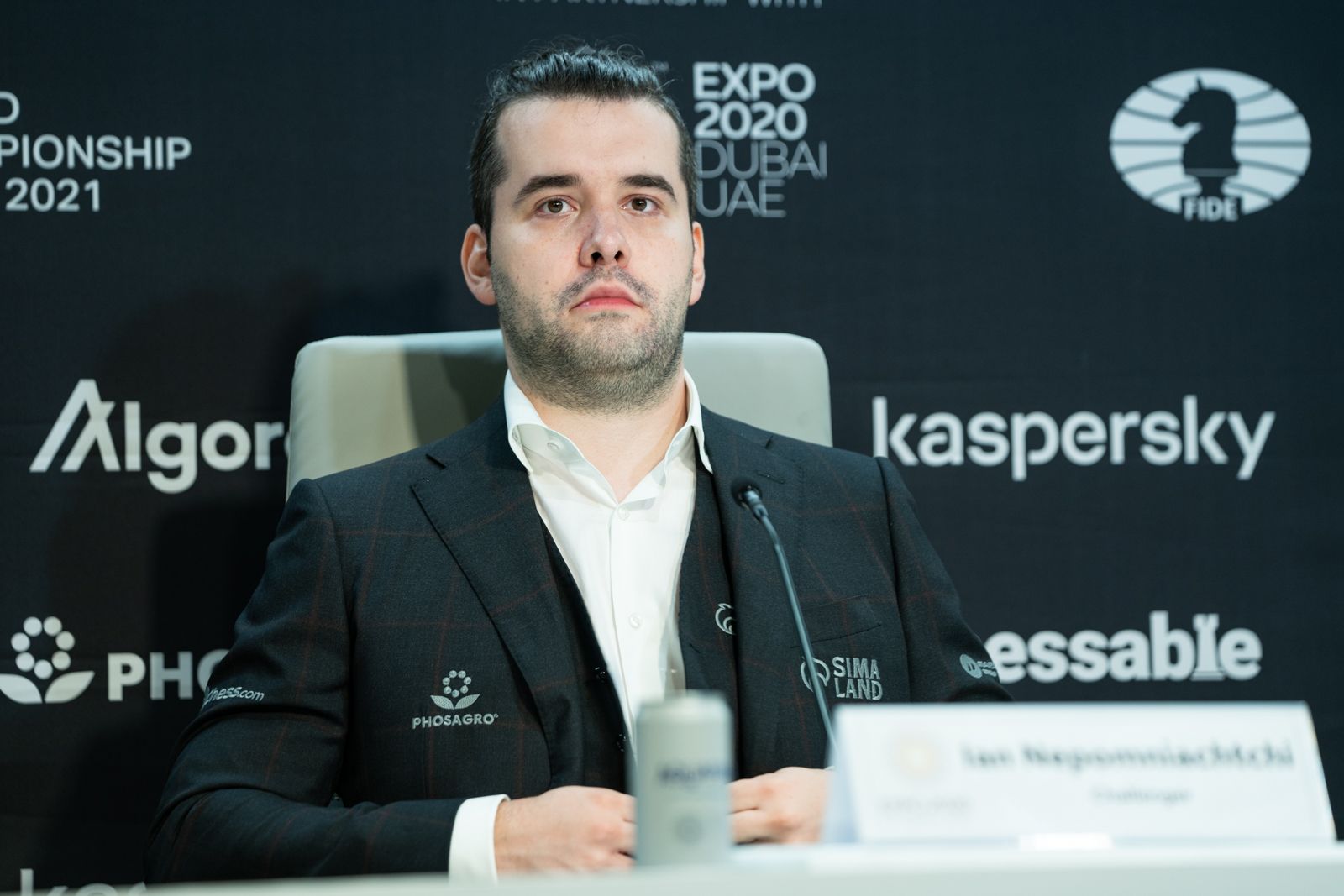
"The result was solid," said Carlsen. "I do feel I was a little bit shaky at times. There are certainly things that I could have done better, but overall I think the result was fair enough."

Match score
| Fed | Name | Rtg | 01 | 02 | 03 | 04 | 05 | 06 | 07 | 08 | 09 | 10 | 11 | 12 | 13 | 14 | Score |
| Magnus Carlsen | 2855 | ½ | . | . | . | . | . | . | . | . | . | . | . | . | . | ½ | |
| Ian Nepomniachtchi | 2782 | ½ | . | . | . | . | . | . | . | . | . | . | . | . | . | ½ |
FM Mike Klein contributed to this report.
Chess.com’s coverage is brought to you by Coinbase. Whether you’re looking to make your first crypto purchase or you’re an experienced trader, Coinbase has you covered. Earn crypto by learning about crypto with Coinbase Earn, power up your trading with Coinbase’s advanced features, get exclusive rewards when you spend with Coinbase Card, and much more. Learn more at Coinbase.com/Chess.
Previous reports:



